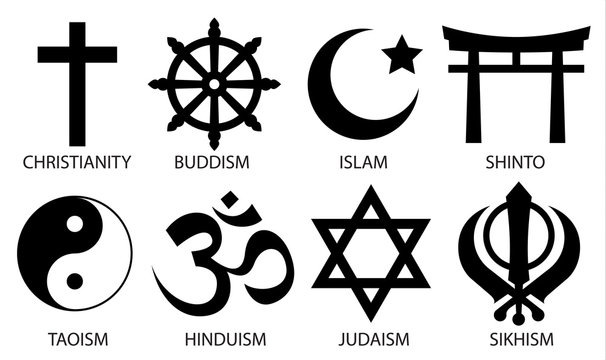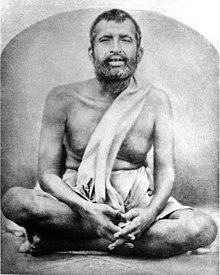Dr Saheb Sahu
Early on, the Vedas announced Hinduism’s classic contention that the various religions are but different languages through which God speaks to the human heart. “Truth is one; sages call it by different names”. To claim salvation as the monopoly of any one religion is like claiming that God can be found in this room but not the next. Normally, people will follow the path that arises from the plains of their own civilization. One becomes a Hindu, Buddhist, and Taoist, follower of Confucianism, Jew, Christian or a Muslim, because one is born into one. People are converted from one religion to another but their numbers are relatively few. In 2020, among the people of the world, 32.2% were Christian, 24.9% were Muslim, 15.58% were Hindus, 6.9% were Buddhist and 15.58 % were atheists or agnostic (non-believers).The rest belong to 4200 or more other religions.
Different religions adhere to different gods as one true God, claim different creation story, and have different ideas about how to live and how to worship. Each major religion teaches that it is the only right one. When people claim that their religion is the only right one and others’ are the wrong one, it leads to religious and non-religious conflicts. Not one religion on Earth has been spared from having a past which was not filled with religious intolerance- leading to many wars and even genocides. According to the famous British historian Arnold Toynbee, for a religious establishment to persecute another religion for being “wrong”ironically puts the persecuting religion in the wrong, undermining its own legitimacy. But they all do. Article 2 of the United Nations’ Universal Declaration of Human Rights forbids discrimination on the religious ground but most countries continue to discriminate their own citizens on the basis of religion.
Although lots of literature has been produced highlighting the strengths and benefits of religion, there also many problems with them. Problems created by religions are: conflict with science, curtailing freedom, instilling fear, claims of having the exclusive truth, leading to religious conflicts, wars and genocide.
Many Paths to the Same Summit
Hinduism has shared her land for centuries with Jains, Buddhists, Parsees, Muslims, Sikhs, Jews and Christians. It is possible to climb life’s mountain from many sides, but when the top is reached the trails converge. At base, in the foothills of theology, ritual, and organizational structure, the religions are distinct. It is good. It adds to the richness of human experience. But beyond these differences the same goal beckons.
Ramakrishnan Paramahamsa
For evidence of this, one of Hinduism’s nineteenth century saints sought god successively through the practices of a number of the world’s great religions. In turn he sought God through the person of Christ, image less, god –directed teachings of the Koran, and a variety of Hindu God–embodiment. In each instance the result was the same: The same God (he reported) was revealed, now incarnate in Christ, now speaking through the Prophet Muhammad, now in the guise of Vishnu the Preserver or Shiva the completer. Out of these experiences came a set of teachings on the essential unity of all religions (Smith).
The saint was Sri Ramakrishnan Paramhamsa (1836-1886). His chief disciple Swami Vivekananda founded the Ramakrishna Math and took Hinduism to the West. This is what Ramakrishna said about various religions.
“God has made different religions to suit different aspirations, times and countries. All doctrines are so many paths; but a path is by no means God Himself. Indeed, one can reach God if one follows any of the paths with whole-hearted devotion. One may eat a cake with icing either straight or sidewise. It will taste sweet either way.
As one and the same material; water is called by different names by different peoples, one calling it water, another eau, a third aqua, and another pani, so the Everlasting-Intelligent-Bliss is invoked by some as God, by some as Allah, by some as Jehovah, and by other as Brahman.
As one ascend to the top of a house by means of a ladder, or a bamboo or a staircase or a rope, so diverse is the ways and means to approach God, and every religion in the world shows one of these ways.
So people in ignorance say, “My religion is the only one, my religion is the best”. But when the heart is illuminated by true knowledge, it knows that above all these wars of sects and sectarians presides the one indivisible, eternal, all-knowing bliss.” (Sayings of Ramakrishnan Pramahamsa)
Religious Ethics
Philosopher and mathematician Bertrand Russell defined ethics as “What sort of actions ought men to perform?” and “What sort of actions men to avoid?” Based on this definition of ethics all religions have emphasized ethical behaviors. All of them have promoted proper treatments of others, truth, honesty and charity. A saying by the Chinese Philosopher Lao Tzu summarizes it well:
“The way to heaven has no favorites.
It is always with good man.” (Tao-te Ching)
(A) Treating others as you like to be treated
“What I do not want others to do to me; I do not want to do to them.”- Confucius, Analects
“Love thy neighbor.”- Thales of Miletus, Greek philosopher (640-540BCE)
“You shall love your neighbor as yourself”. – The Old Testament (Judaism)
“Treat others the way you would have them treat you; this sums up the law and the prophets”. The New Testament (Christianity)
(B) Truth, Honesty, Do not Lie
“From delusion lead me to Truth.
From darkness lead me to Light.
From death lead me to Immortality”. – Upanishads (Hinduism)
“Speak the truth, yield not to anger, give what you can to him who asks; these three steps lead you to gods.- Dhammapada (Buddhism)
“Confucius said: “One who can practice five things wherever he may be is a man of humanity: Earnestness, liberality, truthfulness, diligence and generosity.”-Analects (Confucianism)
“Do not steal, do not deceive and do not lie to one another”. The Old Testament (Judaism)
“Do not veil the truth in falsehood, nor conceal the truth knowingly”. – The Quran (Islam)
(C) Non-violence
“The vow is to be free from injury (Ahimsa), falsehood, theft, chastity, and worldly attachment.”- Jainism
“What is the highest duty?
To refrain from violence.”- Mahabharata (Hinduism)
“A man of strength and violence will come to a violent end”. – Lao-Tzu (Tao-te Ching, Taoism))
“You have heard the commandment “An eye for an eye, tooth for a tooth”. But what I say to you: Offer no resistance to injury. When a person strikes you on the right cheek, turn and offer him the other”.
The New Testament, (Christianity)
“Let there be no violence in religion”. The Quran (Islam)
(D) Charity
“The wealthier man should give unto the needy.
Considering the course of life hereafter;
For riches are like chariot wheels revolving;
Now to one man they come, now to another.”- Rig Veda (Hinduism)
“The more he gives to others, the more he possess of his own”. – Tao-te Ching (Taoism)
“Charity is equal in importance to all other commandments combined”. – The Babylonian Talmud (Judaism)
“It is more blessed to give than to receive”. The New Testament (Christianity)
“They ask you of what they should give in charity. Tell them: “What you can spare of your wealth as should benefit the parents and relatives, the orphans, the needy, the wayfarers, for God is not unaware the good deeds that you do.”- The Quran (Islam)
Conclusion
Different religions adhere to different gods as the one true God, claim different creation stories, and have different ideas about how to live and how to worship. They also have different concepts of the coming afterlife. Most religions claim their Scriptures (Holy Books) to be divinely revealed. But we know from scientific and archeological evidences that they were written by fallible but wise human beings. They have been edited and reedited to reflect the changing times. All religions also have been corrupted by the priestly class who has tried to control the common men and women. Each major religion (except Hinduism) teaches that it is the only the right one.
Causes of religious intolerance are many, but the main cause is ignorance. Not one religion on Earth has been spared from having a past which was not filled with religious intolerance – leading to many wars and genocide. According Historian Arnold Toynbee: “There is no one alive today, who knows enough to say with confidence whether one religion has been greater than all others”.
In spite of differences in the name of gods or God, Holy Scriptures, rituals, there is some wisdom in all the religions. What are the specifics of that wisdom? We should avoid murder, thieving, lying and adultery and give to charity. These are the minimum guidelines. Proceeding from the ethical base to the kind of people we should strive to become, we come to virtues. There are three common virtues: humility, charity and veracity. Humility is the capacity to regard oneself in the company of the others as one, but not more than one. That is, we are no more important than others. Charity is what we can do for our neighbors, who are less fortunate than us. Veracity is defined as being honest and telling the truth. Truth telling.
So what we do? We must see that followers of other religions as men and women who face the same daily problems much like our own. The best thing for all of us to do is to listen and learn from other religious traditions different from ours. Follow the Golden Rule-“Treat others as you would like to be treated”. Be kind to all, including plants and animals. Help others when you can. Treat our earth as “Mother Earth” as advocated by many religions. Do not pollute. Plant trees as many as you can.
I will conclude with two quotations from Epicurus and Buddha.
“Is God willing to prevent evil, but not able? Then he is not omnipotent. Is he able, but not willing? Then he is malevolent. Is he both able and willing? Then whence cometh evil? Is he neither able nor willing? Then why call him God?”- Epicurus (C341-270BCE)
“Do not accept a statement because it is found in our books, nor because it is in accord with your belief, nor because it is the saying of your teacher… Be the lamps unto yourselves”. – Final words of Buddha to his disciples.
Sources
1-Houston Smith, The World’s Religions. New York: Harper SanFrancisco, 1991
2-The Sayings of Sri Ramakrishna. New York: The Vedanta Society, 1903




